- Home
- Robin Hobb
The Inheritance and Other Stories Page 13
The Inheritance and Other Stories Read online
Page 13
I drove on, not going anywhere special now, just counting the cats. I never saw Dougie or Cheryl again, but I did once find another stewed cat by the side of the road. I gathered up what was left of it and took it to a motel that night. I tried every bone. Probably two or three times. Nothing.
I never got to New Mexico, either. I stopped off in San Rafael, to live between my car and the women’s shelter there until I found a computer firm that would hire me.
They’re paying me to go to night school now, and I know that things are getting better for me. If I study hard and pay attention to my job and get along with my coworkers, I’ll get ahead. If I work at it.
There are still times when I think about it. Sometimes, when I’m lying in bed, semiawake after a restless night, waiting for my alarm clock to go off, I think of them, rising from a peaceful night in some dewy field, glowing with health, to start their daily trek down the highways and byways of America. No clocks to punch. No classes to study for. Nothing to do but hike down the road in the fresh morning air, looking for that fifth squashed cat. That’s what works for them. And what works for me is getting up at five to leave the house at six so I can fight traffic and get to work by eight. Who’s to say which way is better? Who’s to say who has the better life? But sometimes, on those mornings when I wonder, I step out of my door early, at five thirty, into the fresh morning air. I look at the wide blue sky, at the sun just opening the day. And I get into my car and drive slowly and carefully to work.
I wouldn’t want to hit someone’s cat by accident.
Strays
Theme anthologies are gold mines for some writers. Give them a topic, and they can write a story around it. Cat story, horse story, a story about a magician with a sword, a haunted house story, a story about a mermaid . . . And oh, how I envy those writers.
I just can’t do it.
Lord knows I’ve tried. But it’s sort of like the fable about the emperor who would give his fortune to the man who could look at a white horse and not think about its tail, but in reverse. The more someone gives me a theme, the more those stories elude me.
But once in a great while, I still manage to wriggle and wrangle a story into a theme anthology. “Strays” is a tale like that. I was approached by Elizabeth Ann Scarborough, a longtime friend and fellow writer. She was editing an anthology to be called Warrior Princesses. Surely, as a fantasy writer, I could come up with a story that had such a character.
Well. No. Or rather, yes and no. I was working on a story. And with a touch or two, perhaps I could convey a bit of royalty to my protagonist.
And once I did, I perceived that she’d actually been a princess all the time. For every female cat is a queen.
Lonnie Spencer looked like a boy. She sat on a rusty bike, one foot on the curb, the toe of her other ratty sneaker in the gutter. She had scabby knees, a smoking skull on her baggy sweatshirt, and a baseball hat backward over her chopped black hair. What’s wrong with that kid’s face? was my second thought when I saw her. My first had been to avoid him because he looked like he’d kick gutter water at you just to get it on your school clothes.
As I edged past, she spoke in a clear girl’s voice, “Take a picture, it’ll last longer.”
I had been staring. I’d never seen anyone my own age with a big scar down her face. It ridged her Native American skin, pulling her cheek and her eye to one side. It was hard not to stare. So I looked down and saw the Barbie doll lashed to the front of her bike. It had a fur skirt and one boob. Her clumpy hair was tied back with gold thread. A tiny wooden bow was slung over her shoulder.
“Amazon,” I said without thinking.
“Yeah!” Lonnie grinned and suddenly didn’t look so scary. “She’s an Amazon warrior. That’s why I cut off her tit. So she can shoot a bow better. I read that they really did that.”
“I know. I read about it too.”
Our eyes met. Connection. We both read, and we read weird stuff, stuff about women who were warriors. It’s so simple, when you’re a kid.
In her next breath, Lonnie announced, “I’m a warrior too. I been teaching myself martial arts. Ninja stuff, swords and pikes, too. I want to learn to shoot a bow. Scars are okay, on a warrior. Hey. My name’s Lonnie Spencer.” She stuck out a grubby hand. She had a boy’s way of doing things. “What’s yours?”
Her hand was scratchy, scabs and dirt and dry skin. “Mandy Curtis.”
“Mandy, huh. Bet you get teased a lot about that in school. Handy Mandy. I hate school. All the teachers hate me and the kids tease me all the time. ’Cause of my scars, you know, and because I don’t dress like they do. They think if you don’t have the right kind of clothes, you’re nothing. Lower than shit.”
Her words spilled forth. I sensed she needed to talk but didn’t find many listeners. I’m a listener, like my mom. She says it’s our curse, to have total strangers tell us their darkest secrets. I glanced at Lonnie again. Not many of the girls I’d met at school would want to be seen talking to her. My clothes were a lot better than hers were and I was still having trouble making friends.
I kept walking. I was supposed to come straight home from school every day. We were new to this neighborhood and Mom was jumpy. Our building was okay, but two blocks away was a commercial strip, and the apartments that bordered it attracted what Mom called “a rougher element.” Mom had never defined that but I looked at Lonnie and knew. She coasted her bike alongside in the gutter as I walked. “I didn’t get my scars in a fight, though,” she volunteered abruptly. “My mom threw me through a picture window when I was two. She was pretty drunk and I was fussy. That’s what she says, anyway. Cut up my face and cut my leg muscles, too.” She watched for my reaction. Her words challenged me. “That’s why I limp when I walk. They had to put over a hundred and seven stitches in me. After that, they put me in a foster home, until my grandma came and got me. Now Mom has me.”
Kids ask the questions that adults swallow. “Why do you want to live with someone who threw you through a window?”
Lonnie lifted one shoulder. “Well, you know, she’s my mom. She went to counseling. And the court says it’s okay, and Grandma is getting pretty old. So.” Again the one-shoulder shrug.
So. That could sum up a lot of Lonnie Spencer. So.
The conversation lagged awkwardly. Mom wouldn’t want me hanging around with Lonnie. I knew it. I think Lonnie knew it too. But I was as desperately lonely as she was. “You go to Mason School?” I asked her, just as she exclaimed, “Oh, no! Not Scruffy, oh, man . . .”
She hopped off her bike, letting it clatter into the gutter. Without a look at me she hurried to a sodden calico body at the edge of the street. I followed her, reluctant but curious. Lonnie crouched close over it; I stayed back. The cat’s mouth was open, white teeth and a sprawling tongue. I wouldn’t have touched that sunken body with a stick, but Lonnie stroked it, smoothing its soggy fur.
“I hope his next eight lives are better than this one was,” she said quietly.
“You really believe a cat has nine lives?”
“Sure. Why not? One old lady, a foster mom, she told me if a cat really likes you, it can give you one of its lives. Wouldn’t that be something? Get to live a cat’s life?”
I looked at the dead cat. “Doesn’t look like he enjoyed it much,” I pointed out.
“I can think of worse lives than being a stray cat,” she said darkly as she unslung her backpack. She pulled out a can of neon orange spray paint. The balls inside it rattled like dice as she shook it. Then she outlined the cat’s body, meticulously tracing each leg and the tail, even the jab of an ear against the pavement. She surveyed her work, then capped the paint and put it away. Without squeamishness, she picked up the little body and moved it to the grassy strip between the sidewalk and the street. The orange outline of the body remained on the pavement, a grim reminder. I was speechless.
Lonnie wiped her hands self-consciously down her shirt. “I don’t think people should just hit a cat and forget it,
” she said quietly. “This way, whoever hit that cat has to look at that outline every time they drive past. I put the bodies up off the street and some city guy comes and picks them up instead of the next fifty cars making him mush.”
“Do you think we should try to find his owner?” I asked in a hushed voice. In a macabre way, I relished the idea of being the bearer of such sad tidings.
“Naw,” Lonnie said dismissively. She looked down at the dead cat with bitterness. “Scruffy didn’t belong to anyone except himself. A stray disappears, no one wonders about it.” She shrugged into her backpack. As she picked her bike out of the gutter, she added, “I figure it’s something I owe them, in a way. My loyal subjects should not be left dead in the street. I done all I can for him, now . . .”
“Your loyal subjects?” I asked skeptically. Being weird is okay unless it’s fake-weird. A lot of kids pretend to be weird just to impress other people. I wondered about Lonnie. Maybe even her scar story was fake, maybe she’d just been in a bad car wreck.
She gave her shrug again. “I’m Queen of the Strays. Even my mom says so. Which reminds me, I’m supposed to be picking up some junk for my mom. See you around.”
She was already pedaling down the street. When she hit puddles, muddy water rooster-tailed up her back, but she didn’t avoid them. Fluorescent cats and a one-boobed Barbie. Genuinely weird, I decided. I liked her. “Yeah, see you,” I called after her.
I got home just as the rain resumed. I called Mom’s office and left a message on her voice mail that I was safely home. I dumped my books in my room and went to the kitchen. Not much in the fridge. There used to be little microwave pizzas or pudding cups when Mom and Dad were together. Not that we’re starving now, just on a budget. I grabbed an apple and some cheese. Then I watched television and did homework until Mom got home. I forgot about Lonnie until late that night. I thought about rain soaking the cat’s body and hoped someone had picked it up. Then I thought about all the live strays, shivering in the rain. Lonnie was Queen of the Strays. I wondered what she had meant and then I fell asleep.
Three weeks passed. I didn’t see Lonnie. I watched for her, in the lunchroom at school or when I saw kids on bikes in the street, but I never saw her. Then one day, walking home from school, I found two outlines of dead cats in the street. The paint was bright and fresh.
I had reached the front of our apartment building and was fishing my key out of my shirt when Lonnie yelled to me from down the block. I waved back and she came in a lopsided run. She favored her right leg. As she came, I realized that her whole body twisted that direction. It hadn’t been so obvious when she was on her bike.
“Hey, Mandy,” she greeted me.
I was surprised at how glad I was to see her. “Hey, Lonnie! Long time, no see. Where’s your bike?”
She shrugged. “Got stole. My mom left it out and someone took it while I was gone. She didn’t even notice until I asked her where it went. So.” She paused, then changed the subject. “Hey. Look what I made.” She pulled a little drawstring bag out of her shirt. It was hanging around her neck on a string. “This is my new, uh, whatacallit, omelette.”
“Amulet,” I said reflexively.
She tugged the bag open. Inside was a little princess doll from a McDonald’s Happy Meal. Like the Barbie, it was missing a boob. As it was dressed in a ball gown, it looked very peculiar. Lonnie shrugged at my frown. “It doesn’t look as good as the other one.”
I changed the subject. “So. Where were you, then?”
She shrugged again as she replaced her amulet. “CPS came and got me, ’cause I missed so much school. They stuck me in a foster home, but they couldn’t make me go to school either. So now I got a deal with my social worker. She lets me live with my mom, I stay out of trouble and go to school.”
“I didn’t see you at school today,” I pointed out. “If you live around here, you should go to Mason.”
“Yeah, I should,” she conceded sarcastically. “But even when I’m there, you wouldn’t see me. I’m in the special-ed classes at the end of the hall.”
“But you’re not retarded!” I protested.
“Special ed isn’t all retarded. There’s deaf kids. And ADD. Hyperactive. Emotionally disturbed. They got lots of names for us troublemakers. They just shove us together and forget about us.”
“Oh,” I said lamely.
“I don’t care.” She smiled and wagged her head to show how little it bothered her. “Mostly I just read all day. They don’t bother me, I don’t give them any grief.”
“Well.” I glanced up at the sky. “I’ve got to go in. I have to call my mom as soon as I get home from school.”
“Oh, latchkey kid, huh?” She watched me stick my key in the security door. “Well, after that, do you want to hang out?”
I stopped. “I’m not supposed to have friends in when Mom isn’t home,” I said awkwardly. I hated saying it. I was sure she’d take it as an excuse to ditch her.
“So who’s going to tell?” she demanded with a superior look. I quailed before it. Knowing I was going to regret this, knowing I’d have to tell my mom later, I unlocked the door and let her in ahead of me.
Our apartment was on the third floor. I was painfully conscious of Lonnie limping up the stairs. There was an elevator at the other end of the building but I’d never used it. I felt almost ashamed that my body was sound and whole and that the climb didn’t bother me. As I unlocked my door, I automatically said, “Wipe your feet.”
“Du-uh!” Lonnie retorted sarcastically. She walked in just like a stray cat, with that sort of wiggle that says they’re doing you a favor to come in. She stopped in the middle of our living room. For an instant, the envy on her face was so intense it was almost hatred. Then she gave her shrug. “Nice place,” she said neutrally. “Got anything to eat?”
“In the kitchen. I’ve got to phone Mom.”
While I left my message, Lonnie went through the refrigerator. By the time I got off the phone, she had eaten an apple, drunk a big glass of milk and poured herself a second one, and taken out the bread and margarine. “Want a sandwich?” she asked as I turned around.
“I hate peanut butter and that’s all there is,” I said stiffly. I’d never seen anyone go through a refrigerator so fast. Especially someone else’s refrigerator.
“There’s sugar,” she said, spreading margarine thickly on two slices of bread. “Ever had a sugar sandwich? Mom used to give them to me all the time.”
“That’s gross,” I said as she picked up the sugar bowl and dumped sugar on the bread. She pushed it out in a thick layer, capped it with the other piece of buttered bread. When she lifted it, sugar dribbled out around the edges. Her teeth crunched in the thick layer of sugar. I winced. I imagined her teeth melting away inside her mouth.
“You ought to try it,” she told me through a mouthful. She washed it down with half the glass of milk, sighed, and took another sandy bite.
As she drained off the milk, I suddenly knew that Lonnie had been really hungry. Not after-school snack hungry, but really hungry. I had seen the billboards about Americans going to bed hungry, but I never grasped it until I watched Lonnie eat. It scared me. I suddenly wanted her out of our house. It wasn’t all the food she had eaten or the sugar mess on the floor. It suddenly seemed that by living near people like Lonnie and having her inside our house, Mom and I had gotten closer to some invisible edge. First there had been the real family and home, Mom and Dad and I in a house with a yard and Pop-Tarts and potato chips in the kitchen. Then there was Mom and I in an apartment, no yard, toast and jam instead of Pop-Tarts . . . We were safe right now, as long as Dad sent the support money, as long as Mom kept her job, but right down the street there were people who lived in cruddy apartments and their kids were in special ed and were hungry. That was scary. Mom and I weren’t people like that. We’d never be people like that. Unless . . .
“Let’s go hang out,” I said to her. I didn’t even put her glass in the dishwasher or swe
ep up the sugar. Instead, I took a pack of graham crackers out of the cupboard. I opened it as we walked to the door. She followed me, just like a hungry stray.
I felt safer as soon as I shut the door behind us. But now I was stuck outside with her on a cold and windy day. “Want to go to the library?” I offered. It was one of the few places Mom had approved for me to hang out on my own. Even then, I was supposed to say I was going there and phone again when I got back.
“Naw,” Lonnie said. She took the package of graham crackers, shook out three, and handed the stack back to me. “I have to pick up some junk for my mom. But we can do my route before that. Come on.”
I thought maybe she had a paper route. Instead it was her roadkill route. Lonnie patrolled for animal bodies. The only thing she found that day was a dead crow in the gutter. It had been there awhile, but she still painted around it and then moved the body reverently up onto the grassy strip. After that, we stopped at two Dumpsters, one behind Burger King and the other behind Kentucky Fried Chicken. They had concrete block enclosures and bushes around their Dumpsters. There was even a locked gate on Kentucky Fried Chicken’s, but it didn’t stop Lonnie. She made a big deal of waiting until no one was around before we crept up on them. “Warrior practice,” she whispered. “We could get arrested for this. You keep watch.”
So I stood guard while she went Dumpster diving. She emerged smelling like grease with bags full of chicken bones and half-eaten biscuits and a couple cartons of gravy. It amazed me how fast she filled up bags with stuff other people had thrown away. At Burger King, she got parts of hamburgers and fries. “What are you going to do with that stuff?” I asked Lonnie as we walked away. I was half afraid she’d say that she and her mom were going to eat it for dinner.

 Ship of Destiny
Ship of Destiny Golden Fool
Golden Fool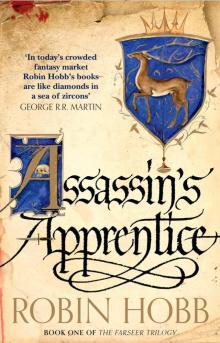 Assassins Apprentice
Assassins Apprentice The Dragon Keeper
The Dragon Keeper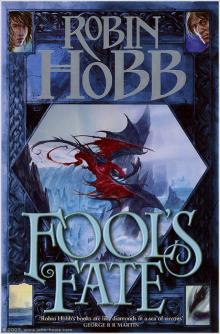 Fools Fate
Fools Fate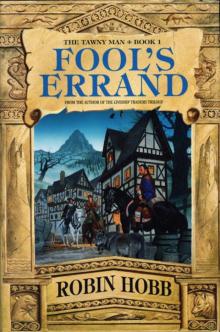 Fools Errand
Fools Errand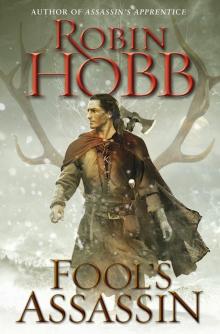 Fools Assassin
Fools Assassin The Mad Ship
The Mad Ship Shamans Crossing
Shamans Crossing Ship of Magic
Ship of Magic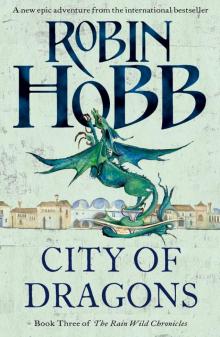 City of Dragons
City of Dragons Dragon Haven
Dragon Haven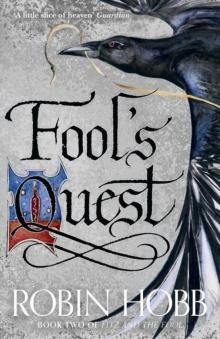 Fools Quest
Fools Quest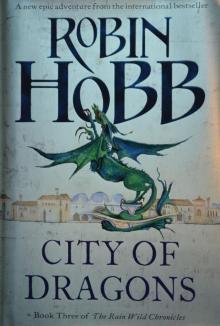 Blood of Dragons
Blood of Dragons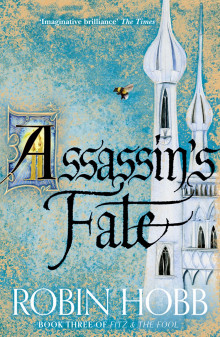 Assassin's Fate
Assassin's Fate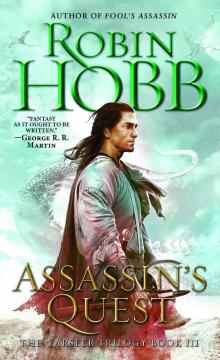 Assassins Quest
Assassins Quest Renegades Magic
Renegades Magic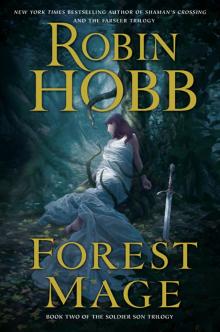 Forest Mage
Forest Mage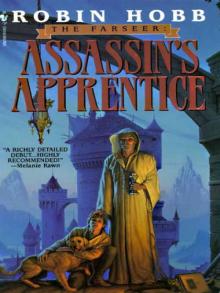 Assassin's Apprentice tft-1
Assassin's Apprentice tft-1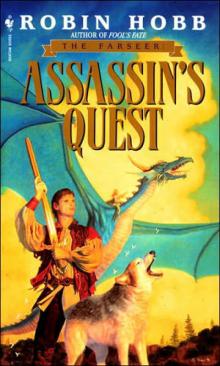 Assassin's Quest tft-3
Assassin's Quest tft-3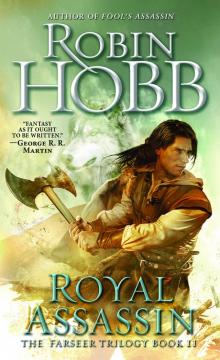 Royal Assassin
Royal Assassin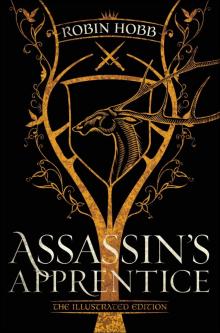 Assassin's Apprentice (The Illustrated Edition)
Assassin's Apprentice (The Illustrated Edition) Assassin's Quest (UK)
Assassin's Quest (UK) Royal Assassin (UK)
Royal Assassin (UK)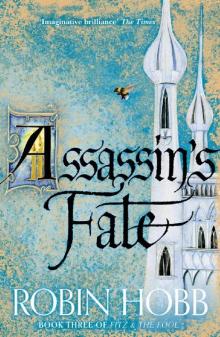 FF3 Assassin’s Fate
FF3 Assassin’s Fate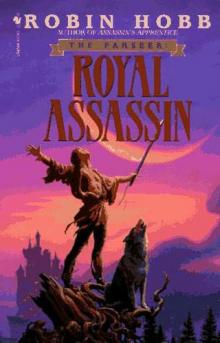 Royal Assassin tft-2
Royal Assassin tft-2 Fool’s Assassin: Book One of the Fitz and the Fool Trilogy
Fool’s Assassin: Book One of the Fitz and the Fool Trilogy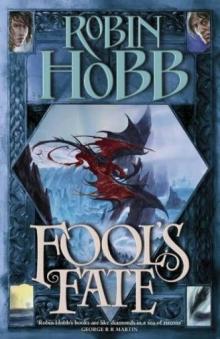 Fool's Fate ttm-3
Fool's Fate ttm-3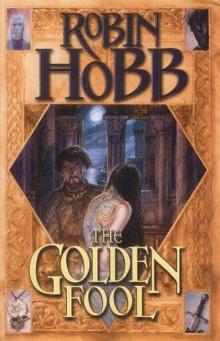 The Golden Fool ttm-2
The Golden Fool ttm-2 The Liveship Traders Series
The Liveship Traders Series The Wilful Princess and the Piebald Prince
The Wilful Princess and the Piebald Prince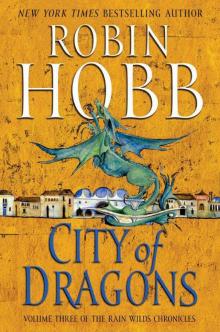 City of Dragons rwc-3
City of Dragons rwc-3 The Tawny Man 1 - Fool's Errand
The Tawny Man 1 - Fool's Errand Words Like Coins
Words Like Coins The Complete Tawny Man Trilogy Omnibus
The Complete Tawny Man Trilogy Omnibus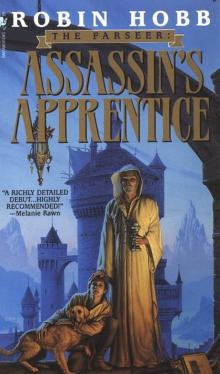 Farseer 1 - Assassin's Apprentice
Farseer 1 - Assassin's Apprentice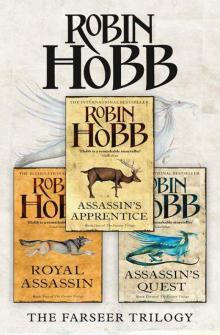 The Complete Farseer Trilogy Omnibus
The Complete Farseer Trilogy Omnibus The Soldier Son Trilogy Bundle
The Soldier Son Trilogy Bundle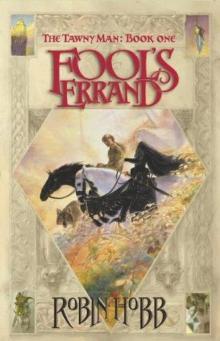 Fool's Errand ttm-1
Fool's Errand ttm-1 Blue Boots
Blue Boots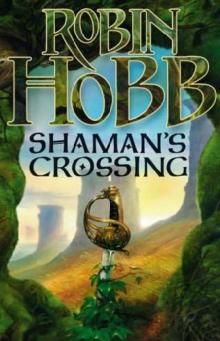 Shaman's Crossing ss-1
Shaman's Crossing ss-1 Mad Ship
Mad Ship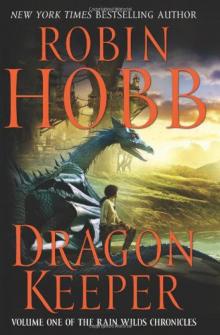 Dragon Keeper
Dragon Keeper The Willful Princess and the Piebald Prince
The Willful Princess and the Piebald Prince Ship of Destiny tlt-3
Ship of Destiny tlt-3 Rain Wild Chronicles 02 - Dragon Haven
Rain Wild Chronicles 02 - Dragon Haven The Dragon Keeper trwc-1
The Dragon Keeper trwc-1 The Triumph
The Triumph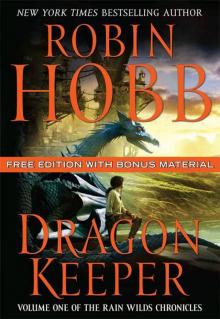 Dragon Keeper Free Edition with Bonus Material
Dragon Keeper Free Edition with Bonus Material Mad Ship tlt-2
Mad Ship tlt-2 The Inheritance and Other Stories
The Inheritance and Other Stories Tawny Man 02 - Golden Fool
Tawny Man 02 - Golden Fool Farseer 2 - Royal Assassin
Farseer 2 - Royal Assassin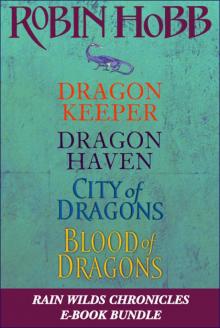 Rain Wilds Chronicles
Rain Wilds Chronicles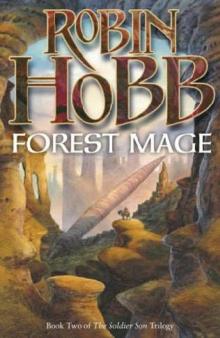 Forest Mage ss-2
Forest Mage ss-2 Ship of Magic lt-1
Ship of Magic lt-1 Renegade's Magic ss-3
Renegade's Magic ss-3